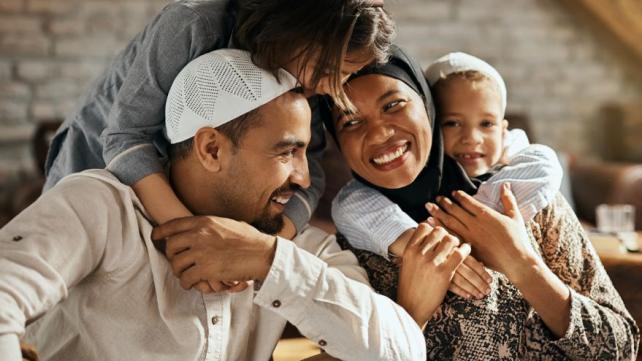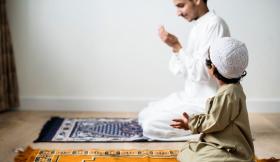
Anas reported: The Messenger of Allah, peace and blessings be upon him, said in his illness before he passed away, “Your family relations! Your family relations!”
Source: Ṣaḥīḥ Ibn Ḥibbān 463
Many Muslims haven’t considered that every Muslim majority nation on the earth, started as a land of disbelievers. When the message of Tauheed was brought to the people many embraced this new way of life. The key was that they shared and passed that knowledge of the oneness of Allah with their family and successive generations. Thus, a Muslim majority nation is established.
Muslims in America may feel that example is beyond their reach. Converts and immigrants to America must look to the legacy of the prophetic age and the earliest Muslims followers – the Sahabah, Tabi'un, and Tabi' al-Tabi'in. Each of them established Islam within their immediate family and then successive generations. Pew research suggests there is already second, third, fourth and fifth generations of Muslims in America made up of descendants of people who embraced Islam and descendants of immigrants. The relationship we have with our families’ shapes whether successive generations continue to practice Islam. Like those earlier communities, prayer, Islamic life and a Muslim identity secured the family inheriting Islam.
Prayer:
O believers! Respond to Allah and His Messenger when he calls you to that which gives you life. And know that Allah stands between a person and their heart, and that to Him you will all be gathered.
Surah Al Anfal 8:24
The American Muslim household distinguishes itself from people of other faiths with the call to prayer rafting through the homes. “Hayya Ala Salah! Hayya Ala Falah” – come to prayer! Come to success salvation!
The early generations of Muslims made prayer a priority. Allah instructs the believers to answer the call to that which gives them life and salvation in this life and the next. Families that pray together strengthen Iman, increase ibadah and create feelings of love and togetherness while in this state of submission.
Prayer is submission. Family members submit to making prayer at scheduled times, submit to making the repeated movements of a rakat, submit to reciting Suratul Al-Fathiah in every prayer. Prayer brings order and ritual. Some family members may remind, others may make the adhan, another may be in charge of prayer rugs and yet another may lead the salah. In many homes a designated place is kept clean and reserved for prayer.
Prayer ends up being a dawah to non-Muslim family members who see the care and planning that Muslims typically make when establishing prayer within the home. Like the earlier communities of Muslims, prayer becomes the expected practice of future generations.
Natural way of life
And [they are] those who say, “Our Lord, make our spouses and our children the joy of our eyes and make us ourselves leaders in piety and righteousness.
Surah Al Furqaan 25:74.
The early Muslims established Islam as a way of life. Joy within a family comes from their unique way of life. For example, all families have established practices even if they don’t recognize them. This may be a certain name of tenderness a grandparent calls a child, a trip that is taken each summer or a recipe made on a day of the week or special day. Generations within a family look fondly at implementing those things unique to their family. The Sahabah, Tabi’un and Tabi' al-Tabi'in made Islam a natural and regular part of their family and society.
American Muslims must make Islam their way of life – not just their religious beliefs. In America’s culture of rugged individualism, a belief is kept close to the heart and doesn’t have to be shared. This also leads to it not necessarily being synthesized into one’s actions. Islam as a way of life permeates all aspects of living - what is eaten, worn, who one marries, how children are raised, treatment of colleagues, neighbors, co-workers, political ideals and even careers considered.
That which becomes a natural part of our daily life and experiences is a preferred standard we look forward to. Families that want to pass down Islamic traditions establish them as the routine in the home that is expected and anticipated: Ramadan activities, Eid day activities, masjid attendance, halaqahs, taleems, Islamic conferences, stories read to children, Islamic movies watched, nasheeds memorized, Muslim scholastic competitions, recipes for Muslim celebrations, dawah, volunteer activities, Muslim sport teams played on – the list goes on. All of these are good things in life to enjoy – some are educational and serious, some are more ibadah while others are just for fun. The key is to pass them on, so family members of all generations naturally seek them out to do.
Synthesize identities
O humanity! Indeed, We created you from a male and a female, and made you into peoples and tribes so that you may ˹get to˺ know one another. Surely the most noble of you in the sight of Allah is the most righteous among you. Allah is truly All-Knowing, All-Aware
Suratul Hujarat 49:13
Many American Muslims stress about their perceived identity. The Muslim who embraces the religion may feel that their culture and heritage is not respected or have self-loathing that it’s not representative of Islam. Others who migrated to America may feel hyper incentivized to promote culture from home feeling guilty they left a Muslim majority society for an un-Islamic one.
Early Muslim generations viewed themselves as Muslims. The Quran helps us understand that Allah created cultures, ethnic groups, communities, nations for humanity, but the only important part of our existence is to seek the pleasure of Allah with our efforts and intentions. American Muslim families must be deliberate and purposeful in understanding generational Islam is predicated upon the fact that above all else each generation identifies first and foremost as Muslims.
Author bio: Mahasin D. Shamsid-Deen is the news curator and content manager for Muslim Network TV (MNTV) and contributing writer for Sound Vision. She holds a Master’s degree in English Writing and has worked as both a High School and College ESL Instructor and Writing Instructor for more than a decade. Mahasin has numerous published articles, books, essays and is a published playwright with three award winning stage plays. She is currently writing her dissertation for her doctoral degree.





Add new comment